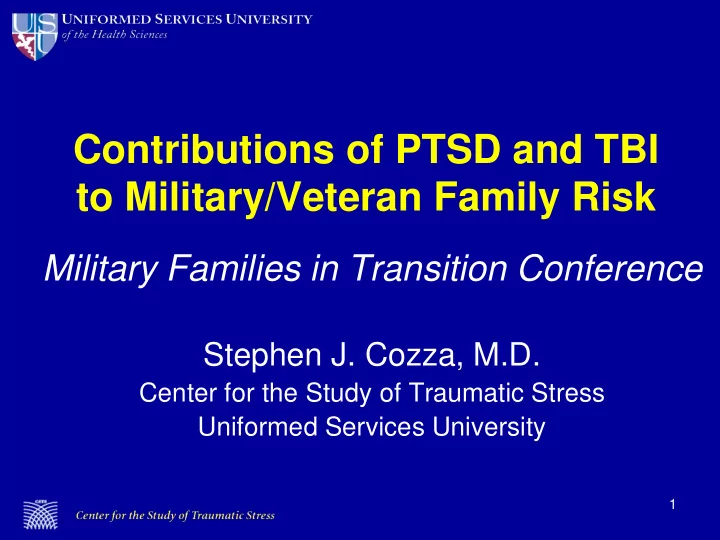

Contributions of PTSD and TBI to Military/Veteran Family Risk Military Families in Transition Conference Stephen J. Cozza, M.D. Center for the Study of Traumatic Stress Uniformed Services University 1
Defining the Problem • 33% combat SMs suffer from TBI, PTSD or depression (Rand 2008) – 250,000 cases of TBI through 2012 (DoD) – 12-18% prevalence rates of PTSD (Hoge et al. 2004, Seal et al. 2007, Schell and Marshall 2008) • 55% AD SMs married/44% have children – 42% of children of AD <= 5 yo • Longitudinal course/effects of disorders 2
Impact of PTSD on Couples • Poorer couple adjustment (Gewirtz et al. 2010) • Negative communication and lower marital satisfaction (Allen et al. 2010) • Greater mutual physical violence (Jordan et al. 1992) • Greater rates of conflict (Sayer et al. 2009) • Negative intimacy satisfaction (Nelson Goff et al. 2007, Monson et al. 2009) • Risk of spouse PTSD (Klarik et al. 2012) 3
PTSD, Parenting and Child Outcomes • Poor problem solving, communication and involvement (Davidson and Mellor 2001) • Decreased parenting satisfaction (Samper et al. 2004) • Greater perceived parenting challenges (Gewirtz et al. 2010) • More child symptoms(Rosenheck and Nathan 1985), intergenerational trauma (Rosenheck and Fontana 1989) • Differential developmental effects 4
PTSD - Mediators and Moderators – Emotional numbing/avoidance most closely linked to interpersonal impairment in relationship with partners and children (Ruscio et al. 2002, Galovski & Lyons 2004) – Co-morbid veteran anger and depression as well as partner anger also mediate family problems(Evans et al. 2003) – Emotional sharing moderates PTSD effects on marital relationship and parental functioning (Solomon et al. 2011)
NMFA Camp Study (n=42) • Injury/parent PTSD symptoms: no direct effects on child functioning • Parenting behaviors: varying direct effects on child functioning – Involvement behaviors- no direct effects – Low monitoring behaviors associated with child conduct problems • Parenting behaviors moderated effects of PTSD ↑ Monitoring as ↑ PTSD: ↓ Emotional Symptoms ↑ Involvement as ↑ PTSD: ↑ Conduct Problems • Results suggest differential parenting effects 6 Holmes, Cozza, Fullerton, Ursano (SRCD 2013)
TBI and Families • More distressing and more disruptive than other injuries (Urbach and Culbert 1991) • More problems with parental irritability, anger, behavioral regulation, cognitive capacity and communication • Impulsive and episodic aggression (Wood and Thomas 2013) • Resultant compromised parenting • Diminished parenting in either parent leads to more child emotional/behavioral problems (Pessar et al. 1993) • Caretaking burden and requirement for continuous professional help (Verhaege et al. 2005, Griffin et al. 2012) 7
Transition Challenges • Long-term impact and transitions in care • Shifts in the national will and reductions in funding • Problems in community reintegration (Resnick et al. 2011) and clinical engagement • Patient-focused services that exclude family members – Lack of clinical expertise – Disconnection of veteran/family care in VA system – SM/veteran hesitation to include family members • Reactive punitive/legal response to domestic violence 8
Challenges - Stigma and Engagement 9
Recommended Actions • Identify the need for sustained care and services • Define PTSD and TBI as interpersonal disorders – Incorporate assessments of interpersonal impact and include psychoeducation • Highlight relationship b/t SM/veteran and family member health 10
Recommended Actions • Implement family focused/interpersonal treatments – Use relationship/functional outcomes in addition to symptom response – Teach collaborative parenting in PTSD/TBI • Utilize violence prevention programs that proactively address risk in families – Family emotion reg, communication, prob solving – ID hotspots/triggers – Build a safety net through planning 11
12
Recommend
More recommend